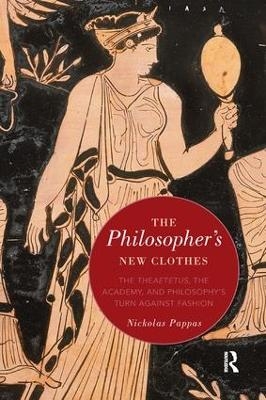
The Philosopher's New Clothes
Routledge (Verlag)
978-0-8153-7239-4 (ISBN)
This book takes a new approach to the question, "Is the philosopher to be seen as universal human being or as eccentric?". Through a reading of the Theaetetus, Pappas first considers how we identify philosophers – how do they appear, in particular how do they dress? The book moves to modern philosophical treatments of fashion, and of "anti-fashion". He argues that aspects of the fashion/anti-fashion debate apply to antiquity, indeed that nudity at the gymnasia was an anti-fashion. Thus anti-fashion provides a way of viewing ancient philosophy’s orientation toward a social world in which, for all its true existence elsewhere, philosophy also has to live.
Nickolas Pappas is Professor of Philosophy at the City College and the Graduate Center, The City University of New York, USA
Introduction
What philosophers do
Philosophy for everyone
The philosopher as eccentric
Plato on the normal philosopher
Socratic legacies
How the philosopher appears
Part I. Socrates in the Theaetetus
Chapter 1. Entering the Theaetetus
Plato’s Academy
The Academy in Plato’s Theaetetus
The frame of the Theaetetus
Enter Theaetetus
Socrates as midwife
No place for philosophy
Chapter 2. Being a philosopher teaching philosophy
The cost of entering the Academy
Unwritten teachings
The shoemaker
The Cyrenaics
Pigs and dogheads
School as institution
Conclusion
Chapter 3. Philosophy’s first citizen
Wrestling and civilization
Where the wrestling happens
Two myths of philosophy’s beginning (archê)
Wonder and the rainbow
Iris the teras
Socrates the philosopher
A new myth of philosophy’s archê
Philosopher as headmaster
The philosophical gentleman
Beyond the Theaetetus
Part II. Philosophy Regarding Fashion
Chapter 4. Fashion in philosophy
Fashion thinking
The emperor’s new clothes
Philosophy of fashion today
Imitation according to the tradition
Beau Brummell, beyond imitating
The foreigner
Chapter 5. Anti-fashion
Alternative to fashion
The tradition of anti-fashion
Anti-fashion today
The suit
Denim jeans
Body art
Black
Black and the body
Chapter 6. Fashion in antiquity
The threat of anachronism. Ancient fashion?
Diversity and contingency in dress
Change in dress
Justification for change in dress
Plato’s Republic
“Better”
Part III. The Philosopher’s New Clothes
Chapter 7. There is no outfit like Greek nudity
Nudity in modern Europe
Nudity for non-Greeks
Recent treatments of Greek nudity
Pausanias
Inspection, sexual and otherwise
Chaste nudity
Ritual nudity
Ritual nudity and athletics
Civic nudity
Theatetus
Chapter 8. You can tell a philosopher
The Cynic display of withdrawal
The limits of philosophical costume
Platonic philosophical nudity
Platonic anti-fashion
Thoreau
Kierkegaard
| Erscheinungsdatum | 07.01.2018 |
|---|---|
| Verlagsort | New York |
| Sprache | englisch |
| Maße | 156 x 234 mm |
| Gewicht | 362 g |
| Themenwelt | Geschichte ► Allgemeine Geschichte ► Altertum / Antike |
| Geisteswissenschaften ► Philosophie ► Philosophie Altertum / Antike | |
| ISBN-10 | 0-8153-7239-6 / 0815372396 |
| ISBN-13 | 978-0-8153-7239-4 / 9780815372394 |
| Zustand | Neuware |
| Haben Sie eine Frage zum Produkt? |
aus dem Bereich


